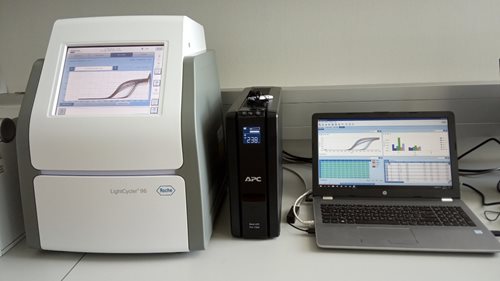|
Supplier |
ROCHE s.r.o. |
|
Year of acquisition |
2018 |
|
Price |
0.6 milion. CZK |
|
Financing |
OP VVV CORE FACILITIES CZ.02.1.01/0.0/0.0/16_017/0002515 |
|
Responsible Person |
prof. PharmDr. Emil Rudolf, Ph.D. |
DNA carries genetic information and determines the development of the whole organism. The discovery of its structure and function was a major breakthrough and subsequently led to a major development in molecular biological analysis. This analysis is one of the most important components of diagnostics and is widely used not only in basic and applied genetic research, but also in fields such as archaeology, zoology, botany, clinical diagnostics, and forensic science. From a medical point of view, molecular biological analysis is mainly used in fields such as pharmacogenetics/genomics, nutrigenomics, prenatal and preimplantation diagnostics, microbiology and other clinical fields, which generally include nucleic acid analysis.
In our department we use cell cultures as an experimental model, which are nowadays an indispensable tool used in research. Among other things, they are used, for example, for the study of anti-cancer therapy and targeted therapy. In the last two decades, their use in the study of tumor biology has proved invaluable for better understanding of tumor development, metastasis progression and interactions with the tumor stroma. The use of cell lines has become an integral part of the study of molecular biology techniques, the characterization of genetic and epigenetic processes, and the study of prognostic and predictive markers for possible individualization of therapy.

The Lightcycler 96 is an instrument that allows quantitative determination of DNA quantity and detection of gene expression by absolute or relative quantification of gene expression in real time based on fluorescence measurements. It is a gradient real-time PCR instrument that uses Peltier cell technology to allow the rapid temperature changes required for this technique. In addition, high-resolution analysis (HRM) can be performed to allow detection of mutations in samples using melting temperature curves with specifically designed probes covering individual mutations. This analysis allows the detection of differences between two DNA sequences under test down to the single nucleotide difference level, e.g. for single nucleotide polymorphism (SNP) detection or mutation analysis.
The instrument is equipped with a 96-well block in which samples can be analyzed in individual tubes, 8-well strips or 96-well plates, allowing up to 96 samples to be tested simultaneously in a single analysis. This speeds up both sample preparation and stand-alone analysis, thereby increasing processing efficiency.
In our laboratory, we have been using a PCR cycler that had a built-in camera around which the samples were moved to capture the fluorescence. In the Lightcycler96, the fluorescence of all samples is captured simultaneously using a CCD camera that is pointed at each well separately, thus avoiding movement of the camera and samples. This ensures that all measurements are compact and the fluorescence increase is always measured under the same conditions.
For fluorescence measurements during analysis, an LED is used as the excitation source and 4 different excitation and 4 emission (detection) filters can be used and combined on the instrument, allowing different fluorophores to be analysed simultaneously in one reaction. The Lightcycler96 has the following excitation/emission options: 470 nm excitation/ 514 nm emission (e.g. for the detection of fluorophores: SYBR, FAM, ResoLight dye); 533 nm excitation/ 572 nm emission (e.g. for the detection of fluorophores: SYBR, FAM, ResoLight dye); 533 nm excitation/ 572 nm emission (e.g. for the detection of fluorophores: SYBR, FAM, ResoLight dye). VIC, Hex, Yellow555); excitation 577 nm/emission 620 nm (e.g. for detection of fluorophores: Red610, Texas Red), excitation 645 nm/emission 697 nm (e.g. for detection of fluorophores: Cy5).
Thanks to the purchase of the Lightcycler96 instrument, we have supplemented the instrumentation of the molecular biology laboratory, which will help us to obtain information about cellular processes at the DNA level and also allow a more comprehensive assessment of all physiological and pathological processes, which could in the future improve the effectiveness of treatment strategies for some serious diseases. This instrument is used by students of the Faculty of Medicine and Pharmacy of Charles University as part of their postgraduate studies and allows them to process biological samples more efficiently. The obtained results will be used by the students for publishing activities, representation of the faculty at national and international conferences and last but not least for successful completion of their studies.
Author: RNDr. Veronika Skarková, Ph.D.